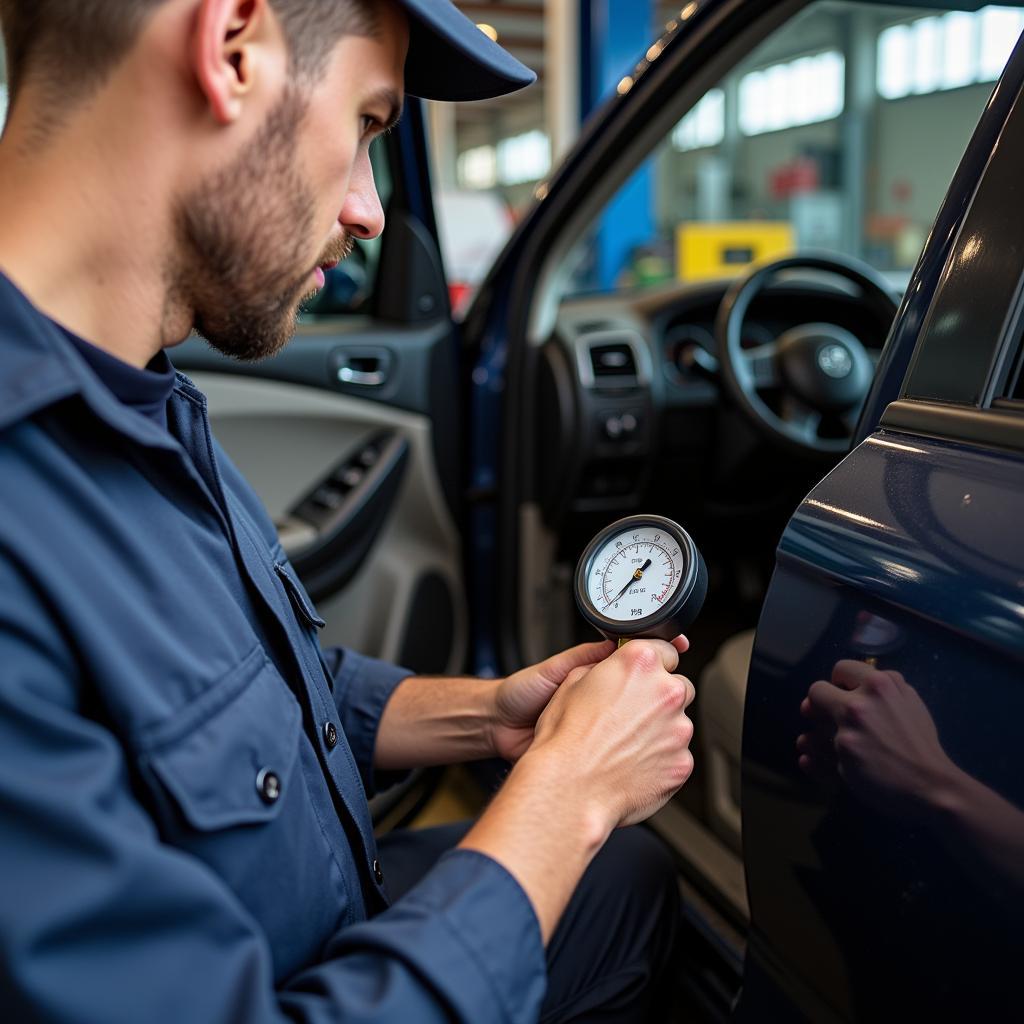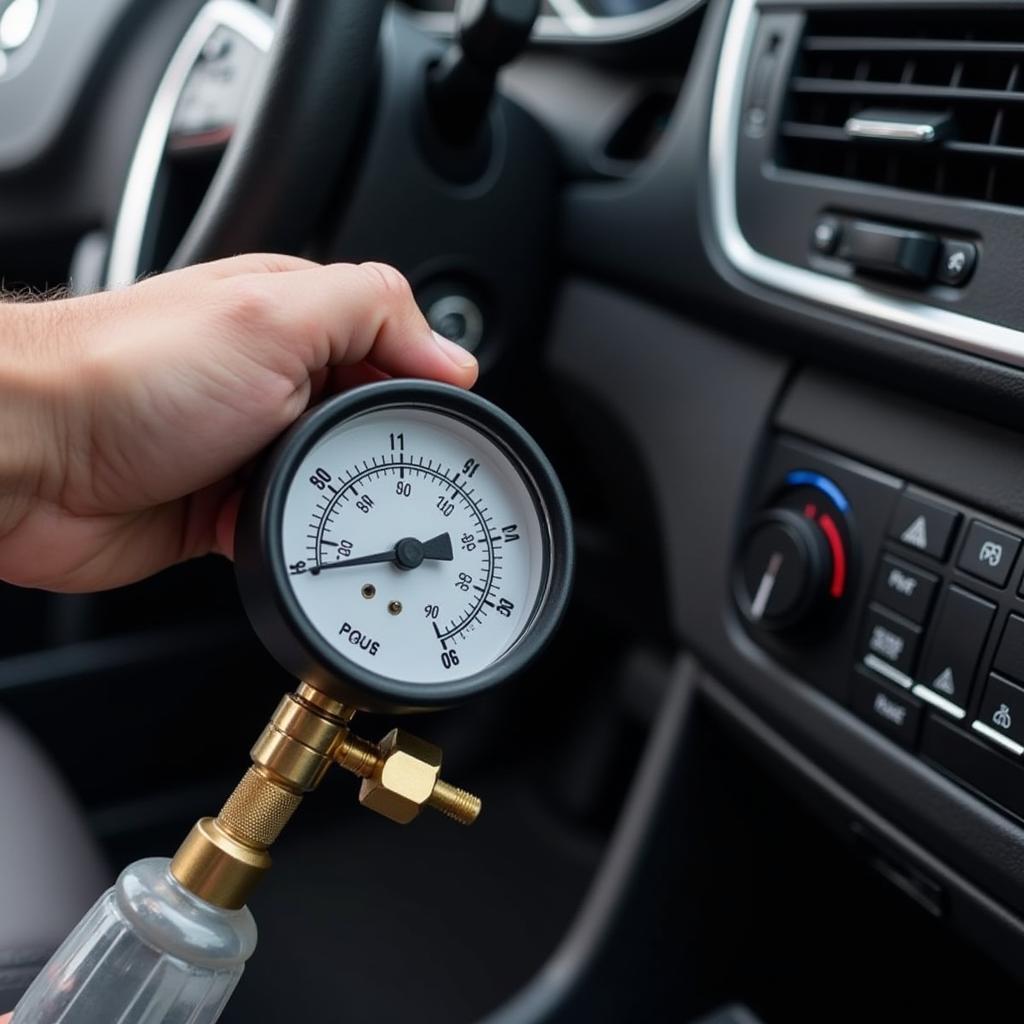Trying to beat the summer heat but your car AC is blowing hot air? Don’t sweat it! It’s a common problem, and often, it can be fixed without a trip to the mechanic. This guide will walk you through some of the most common reasons your car AC might not be working and show you how to get cool air flowing again.
 Car AC blowing hot air
Car AC blowing hot air
Common Causes of Car AC Problems
Before you can fix your car’s AC, you need to pinpoint the source of the issue. Here are some of the usual suspects:
- Low Refrigerant: Your car’s AC system uses refrigerant to cool the air. If the refrigerant level is low due to a leak, your AC won’t be able to cool properly.
- Electrical Issues: The AC system relies on several electrical components, including fuses, relays, and the AC control module. A blown fuse or a faulty relay can easily disable your AC.
- Compressor Problems: The compressor is the heart of your AC system, responsible for compressing and circulating the refrigerant. If the compressor is failing, your AC won’t function correctly.
- Clogged Condenser: The condenser looks like a radiator located at the front of your vehicle. Its job is to cool the refrigerant. If it gets clogged with debris, your AC system won’t work efficiently.
- Blend Door Actuator Malfunction: This component controls the blend door, which directs airflow over the hot and cold coils in your HVAC system. A faulty blend door actuator could be the reason you’re only getting hot air.
Troubleshooting Your Car’s AC
Now that you know some of the common culprits, let’s move on to some basic troubleshooting steps:
- Check Your Fuses: Locate your car’s fuse box (check your owner’s manual) and find the fuse that corresponds to your AC system. Inspect the fuse for any signs of damage or burning. If the fuse is blown, replace it with a new one of the same amperage.
- Inspect the Cabin Air Filter: A dirty cabin air filter can restrict airflow and reduce your AC’s efficiency. Locate the filter (usually behind the glove box) and replace it if it’s dirty.
- Listen for Unusual Noises: Start your car and turn on the AC to its highest setting. Listen carefully for any strange noises coming from under the hood, like clicking, hissing, or grinding. These noises could indicate a problem with the compressor or other components.
When to Call a Professional
If you’ve gone through the basic troubleshooting steps and you’re still stuck with a broken AC, it’s time to call in the pros. Here are a few signs you need professional help:
- You suspect a refrigerant leak. Refrigerant leaks require specialized equipment to detect and repair.
- You’re experiencing electrical issues. Electrical problems in a car can be dangerous to diagnose and repair without proper training.
- The compressor is making loud noises. This usually indicates a serious problem that requires professional attention.
Wondering where to take my car to fix the ac? You can visit a trusted mechanic or consider specialized AC repair shops.
 Mechanic inspecting car AC system.
Mechanic inspecting car AC system.
DIY vs. Professional Repair: What’s Right for You?
Some car AC repairs are simple enough to tackle yourself, like checking fuses or replacing a cabin air filter. However, more complex issues like refrigerant leaks or compressor problems are best left to the professionals.
“Working with refrigerant requires specialized tools and knowledge,” says John Smith, a certified automotive AC technician. “Attempting to recharge your AC system yourself without proper training can be dangerous and could even damage your vehicle.”
 Car AC refrigerant recharge process.
Car AC refrigerant recharge process.
If you’re not comfortable working on your car’s AC system yourself, don’t hesitate to get car ac fixed by a professional. They have the experience and expertise to diagnose and repair even the most complex AC problems safely and effectively.
Tips for Preventing Future Car AC Problems
Prevention is key when it comes to keeping your car’s AC running smoothly. Here are a few proactive steps you can take:
- Schedule regular AC maintenance. Just like you get your oil changed, your AC system needs routine checkups to ensure optimal performance.
- Keep your car clean. Regularly clean the area around your car’s condenser to prevent debris buildup.
- Run your AC periodically. Even during the colder months, it’s a good idea to run your AC for a few minutes every couple of weeks to keep the refrigerant circulating and lubricate the system’s seals.
- Address any strange smells immediately. A musty odor coming from your vents could indicate mold or mildew growth, which can often be resolved with a simple AC treatment. Learn how to fix stinky air conditioner in car.
Conclusion
A properly functioning car AC system is essential for a comfortable driving experience, especially during hot weather. By understanding the basics of how your AC works and following the troubleshooting tips outlined in this guide, you can often identify and even resolve minor issues yourself. However, don’t hesitate to seek professional help for more complex problems, especially those involving refrigerant or electrical components.
Remember, regular maintenance is crucial to prevent future AC headaches and keep your cool on the road. Need help getting your car’s AC back in tip-top shape? Contact AutoTipPro today at +1 (641) 206-8880 or visit our office at 500 N St Mary’s St, San Antonio, TX 78205, United States.




Leave a Reply